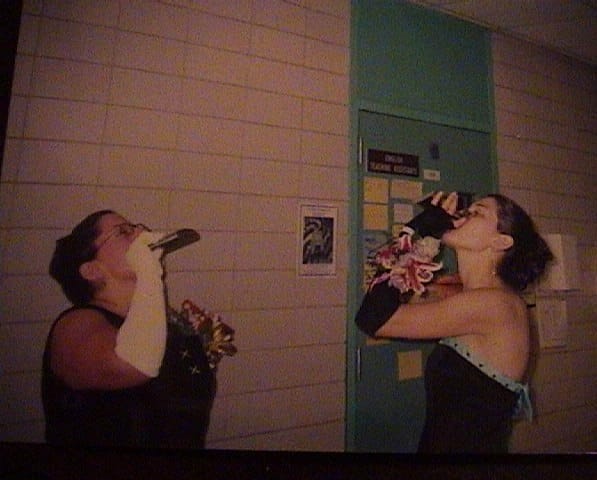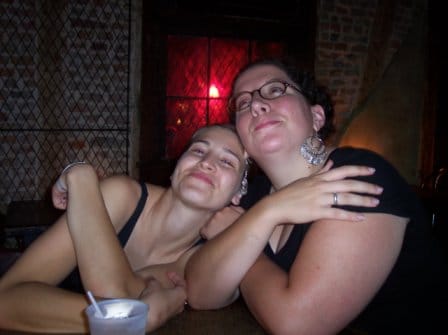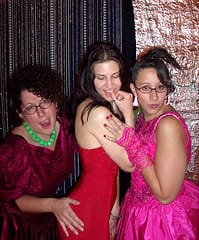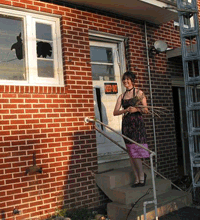My Katrina Evacuation

IN AUGUST 2005, I was in graduate school at the University of New Orleans.
I was married to my first husband, Dan. He was a darling man, if neither trans nor gay and therefore not a sustainable romantic mate—as much as I wished he could drag me into an acceptable version of life. Because I was hell-bent on having one, and because I adored him. And he adored me. And he was funny, and kind, and we almost never fought.
“That’s right,” he would say, nodding slowly, looking me dead in the eyes while I sat on the living room couch and he strolled past me, nude, on his way to the bathroom. “I’m getting ass-naked to take a shit.”
When I started laughing, he would widen his eyeballs, in mock seriousness, and raise his voice. “Ass-naked,” he would yell, “to take a shit!”
We got married in 2004, in Fiji. It was at the end of a six-month excursion around Asia and the Pacific, which I’d financed by working enough jobs to ignore my deeply suppressed trauma and identity. After we returned, we moved to Louisiana from Ohio, from which we both hailed, to start separate master’s programs. I was doing writing. He was studying coastal geomorphology.
Shortly after we started at the University of New Orleans, we were invited to a party, where he joined a beer-pong team. Inexplicably—gloriously—he named it “The John Stamos Experience.” I couldn’t imagine another human who would bring more joy to my life.
When Hurricane Katrina was en route to the Gulf Coast a year later, Dan and I had already evacuated New Orleans for another hurricane—needlessly, it turned out. We’d suffered a few nights in an astoundingly stinky Texas motel with my best friend, Lauren Rice, and her derpy boyfriend, Mike, after piling into his car along with their Pomeranian, Mr. Bingley.
When Dan and I saw the news about the incoming Katrina on the little TV/VCR combo in our apartment, I put my foot down and told him that I would not leave this time. He put his foot down, too, which he did very rarely. Across several debates, he told me that yes I fucking would.
I’D RETRIEVED MY silver Honda Civic from Ohio only weeks before, on a visit “home.” My father had “bought” the new, 2002 car for me a few years before—meaning he put little or no money down in my name, as a “father” could apparently do, before dumping it and its payments on me as a college graduation “present.” In short order, he got caught embezzling money from his company, left my mother, rendered her houseless and carless as he declared bankruptcy, and left me with another $20,000 of debt he’d taken out in my name.
When I left for grad school, in late 2004, my mother took over the Civic until she could get her own car. So for my first year at U.N.O., I either biked the five miles to campus, arriving tired and pouring sweat—or bussed there, arriving tired and, often, pouring sweat.
The Saturday before Katrina made landfall, Dan and I got into my Civic with Rice. She’d since mercifully broken up with her boyfriend, who had custody of their Pomeranian at the time. Readers of The Whenever may recognize Rice as my now dearly departed friend who was murdered in 2020. In the essay below, I call her by her first name, Lauren, though I never did in real life; it seemed like the academic thing to do. I wrote this for an independent study I did online, when campus was shut down, and I was bouncing around places to stay in Ohio, for four months.

My father lived with his young girlfriend. My mother had been staying with friends, herself, for years; she moved into her own apartment only midway through our extended evacuation. My in-laws were limitedly and less than welcoming. My already crushing, closeted sense that there was no place for me in this world intensified.
In pre-Katrina New Orleans, I’d felt happy enough. I had access to regular drag king shows, and a great husband—who’d agreed to an open marriage I’d proposed just weeks after our wedding, having immediately felt trapped by “wife”-hood, even if I was too scared to admit why. I had, in Rice, an unconditionally loving best friend, who also gave me the nickname “Mac,” a placeholder in my life and byline that made pretending to be cis more survivable for an extra decade. (When I did transition, it also gave me a new, legal last name to replace that of my former enslaver/father.) I had a beautiful apartment, the second floor of a duplex owned by a distant cousin, a French Quarter waiter I hadn’t met until some relatives who heard we were moving connected me to him. He was gay, and the apartment had been furnished by another gay, a rich (?) friend who’d left his leather couches when he’d gone off to do rich-gay (??) stuff.
This was already so many more levels of even cis gay prosperity than I, a Midwestern child raised Catholic in the 1980s, could have imagined.
I know now that Katrina only accelerated my acknowledgment that I was in an untenable marriage. In addition to being shook by the displacement emotionally, physically, Dan and I spent a lot of it apart. I stayed often with my undergraduate best friend, Erin; he went back down south for a lengthy research project. In the midst of my Katrina-era ungluing, I was glad for it. Though I left it out of the university paper below, I spent months of our evacuation fucking my on-and-off girlfriend of ten years—another man with a vulva—so fucking hard.
And so much. One afternoon in Columbus, we fucked for so long that she was almost criminally late to pick up her girlfriend’s kid from school. We fucked on the couch and in the bed of her sister’s empty condo, which was in Akron, if I remember correctly, and in my mother’s first post-divorce condo, in…I want to say Willowick, both when she was there and when she wasn’t. We fucked in a hotel in New York City (long story), and in a hotel bed in Ashtabula, with Rice and Erin on the suite’s pull-out. Before I’d asked Dan to expand the rules of our open marriage, which initially prohibited fucking, we’d made out at the Lake Erie cottage of my dad’s boyfriend (even longer story), where we met one day after I clocked out of my job—going to and then writing feel-good copy about hospices. Later, we went back to the cottage and fucked there, too.
We fucked like our lives depended on it. One night, entwined on a blow-up mattress on Erin’s guest-room floor, door shut, my ex’s fingers worked me to orgasm, like they’d been doing since I was sixteen. Quietly, confidently, she said, face close to mine, breath in each other’s mouths as I got close: That’s it.
RICE WENT BACK to NOLA first. She ended up on the phone with me, on her knees outside her apartment, sobbing on the sidewalk, after finding everything she owned destroyed by the mold that grew once the floodwaters receded.
When Dan and I returned to our apartment, just after Christmas, everything was just as we left it. My cousin/landlord had already told us it would be. Except, we still didn’t get mail delivery. And the water came out of our taps in a tiny, infuriating trickle. And, it wasn’t safe to drink. But while we lived only a few blocks from Rice, we were on the elevated side of Esplanade Avenue, on a slight ridge of untouched streets among the destruction.
The university had been trashed. We English and writing graduate students who taught undergrads in exchange for tuition worked out of our appointed lounge, concerned about our health as crews did mold remediation at the same time. Some of my professors showed up to school looking wrecked or hungover.
I was wrecked, too.
I couldn’t stop crying to my friends that I wanted, but didn’t want to want, my queer lover in Ohio—who, aside from being not my spouse, wasn’t a good fit for me. Rice, homeless, moved into our apartment, but after some weeks, Dan felt crowded, and we asked her to leave for the FEMA trailer she got assigned, far away in a desolate lot; it was later found to be toxic. Ultimately, one of our professors found her a room in the giant house of a rich lady uptown. After that, she was often drunk by the middle of the day.
When Dan and I graduated at the end of that semester, we left New Orleans. He got a good job in Columbus, where I continued, and even escalated, my affair for a while. Sometimes I hung out with my mistr(ess)’ dude-friends who were trans; all of them were straight, and none of them were that nice to me. I was juggling a lover and a husband, neither of whom would want to be with me if I was myself. Every time I saw the gay couple in our apartment complex—the one I’d rented for us in Columbus’ gayest neighborhood—holding hands as they went out to run errands or whatever, I recognized the piercing pain in my chest as the pang of impossibility.
In early 2007, I ran from that marriage, and from the entire Midwest, to a magazine internship in San Francisco. Very quickly, both before and after my divorce, I got into one abusive relationship after another, with cis men who identified as straight but felt closeted to me. They felt like my only option They felt like as close as I’d ever get, to love.
REREADING THIS ESSAY now, I see I was trying to put a positive spin on the end of it. Partly that was a coping tactic, but partly it was a belief I had, then, that it was a narrative necessity. I hope you’ll tolerate my lack of perspective as a white person who’d never gone hungry (and the maybe-dorky hed and subheds, which I’ve left with love to my 25-year-old self ♥︎). But when I so much as skim the parts about FEMA and the Red Cross, I still want to rip my heart out of my chest with frustration. As I write this, I’ve been crying for half an hour after reading the part about the footbath.
It’s impossible to say how, and if, my life would have been different had New Orleans’ ground not been swept from under my feet, then out to sea with so much else, starting on August 29, 2005. Nearly 1,400 people lost their lives entirely. Hundreds of thousands of others, mostly people with low incomes, had theirs permanently uprooted, in ways that further disenfranchised them.
My experience added, obviously, to my trauma brew. I did refuse to buy hardly any belongings, including furniture, for all three of my apartments in San Francisco, until my second husband moved in. But I can’t strain Katrina out, can’t isolate it, from so many other events and forces that contributed to my enduring sense of unsafety and instability.
I was there, and then I left, and then I went back. And that’s all I can know.

WHAT AN EVACUEE GETS
What We Came With
The short, eagerly dressed clerk behind the desk at the Holiday Inn Express in Jackson, Mississippi, shuffled papers and crossed a black ballpoint line through something on a list. The other, taller employee glanced at me. He was checking in a middle-aged mother who had laid her head and red, untamed hair on the counter. She’d done this after saying, “I don’t have any choice,” by which she meant that she would consent to paying $85 for a smoking room with a king-size bed. The taller clerk chided the other for ignoring me, which he was doing, I understood, because he thought I was with the sad, frizzled woman. Even as I did it, I wondered why I stood silently letting this happen. Maybe because it was 1 am. Maybe, or probably, because the longer he went on making this mistake, the uglier and more deserved the sneer I could shoot at him. My uncharacteristic patience awarded me nothing; he offered me the same deal. I sighed heavily and walked out. Unlike the mother’s children, my husband and neighbor, though tired, were both in their twenties and wouldn’t cry when I returned to the car and told them we had to keep going. Holiday Inn: 1. Hurricane Katrina evacuees: 0.
We’d coasted out of New Orleans at an easy 72 miles an hour that Saturday night, two days before the hurricane was expected to make landfall and one day before most of the rest of the city truly started panicking and backing up freeways for hundreds of miles. We eventually settled on an interstate exit dive twenty miles beyond Jackson whose $50 fee, we discovered with amazement and delight, included unlimited free pornographic movies. When we woke up Sunday morning and the storm had strengthened, we knew we wouldn’t be going back anytime soon. We decided to head for my in-laws’, and were in Ohio by the time the winds even kicked up on our part of the coast.
The three of us tore ourselves away from Dan’s parents’ couch and seven hours of The Weather Channel, which had nothing but short segments showing rain and darkness in the French Quarter, on Monday to go shopping. My husband had brought only two pairs of tattered work shorts and as many tee shirts, plus a toothbrush and pair of sandals. I sat on the Old Navy dressing room floor with Lauren, my vehicle-less neighbor who’d escaped with us, and debated filling out an application, just in case, while my husband tried on jeans. When he tried to pay his $80 total with the MasterCard his mother had given him, the cashier said no.
“It’s against our policy,” she told us.
“But I have her ID too, see?” my husband responded.
“I’m sorry, we can’t do that. We do not accept cards from anyone other than cardholders.”
“Can’t you call her or something?” I asked. “Her phone number’s right on the ID, and she can tell you it’s okay that he uses her card.” The girl kept shaking her blond ponytail.
Dan took a step back from the counter. “What do you want to do?” he asked me.
“I don’t know. We can’t pay for it right now,” I said. “And you need more clothes.” I turned back to the cashier. “Listen,” I said, putting my hands on the counter. “We’re from New Orleans. We evacuated the day before yesterday and we don’t have any stuff. Can’t you ask your manager or something if there’s something you can do?”
The girl didn’t seem particularly impressed by my claim, but she held her hand out for the card. Dan handed it to her, and she swiped it for him. “Okay,” she said. “We can do this this one time.” Dan signed the receipt. “Good luck to you guys.”
When we walked out into the parking lot, I laughed. “Well, if I do need to find a job, I’m sure they’ll hire me. All I have to do is tell them where I’m from.”
“Well, they should,” Lauren said. “We’re freakin’ evacuees. People should be giving us all kinds of stuff.”
What We Scored: Goods
We needed everyone to give us a break. When floodwaters started pouring through levy breaches the next day, we decided we deserved one. Since my current optometrist occupied an office that was steadily slipping underwater, I called my old college optometrist. After her secretary answered the phone, I started talking fast. “Listen, I know I haven’t been there in a while”—five years, actually—“but I live in New Orleans. I just evacuated from New Orleans and I don’t have any contacts. I’m wondering if there’s any way I can get a free trial pair because I don’t have enough money for another exam and there’s no way to get my prescription from my doctor down there and you already have all my measurements. I mean, I know my prescription; I just don’t have it on any documents. I didn’t know what else to do. I can’t see.” This last part was a lie; I had fled in my glasses, but I almost never wore them usually. My eye doctor got on the phone and I repeated my story. She said she would mail me a trial pair, and, after thanking her profusely and hanging up the phone, I threw my arms triumphantly in the air. One less thing to worry about.
Back on the couch, Lauren was watching CNN with despair. “I need coffee,” she said.
I drove her to the Starbucks around the corner, where she ordered a bag of gourmet grounds to take back to our temporary shelter. The cashier started asking her questions about what sort of coffee maker she used, and she broke down. “I don’t know. I don’t live here. I’m from New Orleans, and I’m staying with these people, and all they have is Folgers, and I just need some coffee.” The cashier apologized for making buying coffee so hard, picked out his best guess for her, and the woman in line behind Lauren paid her tab.
What We Earned: Pity
The next day, I took Lauren to a cosmetology school to get her haircut. Our horror at the news had turned to numbed boredom, and we thought a discounted, senseless distraction might make us feel better about the very uncertain state of our apartments and equally unsure futures. Though cosmetology students take attitude with people in general, and tense, unmade, braless women in particular, the immaculately kempt twenty-year-old graciously allowed me to sit at her station and watch after Lauren filled out her New Orleans address on the customer ID card.
By that time, everyone had seen the footage on the news. By that time, everyone knew how depressing our prospects were. Sitting in a spare black swiveling chair, the bleakness dawned on me as well. It was possible that everything I owned minus two camisoles, one jean skirt, a pair of shorts, a toothbrush, and the flip-flops on my feet was destroyed. We all taught and took classes at the University of New Orleans, and it was possible the school would no longer exist. We were jobless, homeless, and possessionless for an indeterminate period of time, and it was impossible to know when or if we’d be able to finish our degrees. My husband and I had been planning to graduate and move out of Louisiana in less than a year, get jobs with our masters’, and establish our grown-up existence. I’d been preparing to get pregnant soon. Now, I had no plans but to wait around my in-laws’ and see what would happen to my life.
The cosmetology student’s supervisor stopped over at the station to check on Lauren’s new layers. “Hey, they’re from New Orleans,” the student told her.
The supervisor looked over at me and I met her eye. She crumpled her meticulously waxed eyebrows, titled her head to her right shoulder, tsked softly, and uttered a sad, slow, “Aww.”
Read about U.N.O.’s first post-Katrina M.F.A. prom:

What We Needed: Cash
My best friend from college called later that night to check on me. “So when are you guys going back?” she asked.
“Erin,” I said. My throat tightened. “We’re not going back. Haven’t you seen the news? We can’t go back.” I started crying for the first time since we left, and she listened to me sob for twenty minutes.
Two days later, a care package with Erin’s return address arrived. It contained gas cards and gift certificates, as well as clothes, beauty products, and tampons. The mail also brought us a card from a woman we’d never heard of, a friend of my Californian aunt’s, who’d heard about our situation. Inside the card was a check for several hundred dollars.
What We Suffered: Irreparable Disenchantment with Bureaucracy
We’d taken Lauren to the train station so she could get to her parents’ house in Iowa, and decided it was time to get help for ourselves. We drove to the local Red Cross branch and sat down with a worker to file for aid. After half an hour, he reached the question on the application requesting directions to our apartment. My husband and I looked at one another.
“Like, from here?” I asked. Another worker approached with the fruits of our labor: a $75 grocery voucher, a $260 clothes voucher valid only at Super K-Mart, and two tiny plastic bags containing a few cheap toiletries.
“What should I put here?” our interviewer asked her as she handed us the bags. She leaned over and looked at the place he indicated on the application. “I mean, it’s not like we’re going to go there.”
She shook her head. “No.” She looked up at the man, and he smiled. “No, I guess we’re not,” she laughed, and he laughed, while Dan and I watched their insensitivity with disbelief.
After dozens of tries, we finally got ahold of FEMA, whose hotline message, when overloaded, tells callers to try back another time and disconnects them, after midnight one Friday night and filed our application. But a couple weeks later, when all our Gulf Coast friends and neighbors received cash deposits in their bank accounts, we received nothing. After dozens of additional tries, we connected with a representative who told us that we were denied assistance because we’d answered a question wrong on our application, and that the answer couldn’t be changed. Ten or fifteen calls later, we spoke to another representative who told us that what the last rep had told us was ridiculous, that we hadn’t answered anything incorrectly, and that we were welcome to appeal our denial. When I demanded a supervisor, the rep told me that there were no supervisors, and when I refused to hang up without talking to someone in charge, I waited on hold for half an hour. The supervisor who finally picked up told me brusquely that the people who answered the phones were just contract employees in call centers all over the country and couldn’t be held responsible for the information they gave out.
I said, “Well, you don’t have to be so nasty!” By this time, I was sobbing. “What are we supposed to do? We need to buy clothes, and food, and we need money.”
“Have you already filed with the Red Cross?” she asked. In addition to having filed already, we’d called them back and asked them for more help. “We already gave you a grocery voucher,” they’d said, to which we responded that between the two of us, we ate more than $75 worth of groceries in a month. They gave us a check for a couple hundred more dollars and said that we’d exhausted our aid and not to call again.
“Yes, we’ve already talked to them. They’re not giving us anything else,” I said.
“Okay, well, call the Salvation Army,” she said. Here is the retort I thought of later: “What’s the Salvation Army going to give me? Old pants?” But instead of saying this, I started crying harder and hung up while she was giving me their number.
When I went to Walgreens the next day, the high school kid who checked me out asked me if I wanted to donate money to Hurricane Katrina victims. Every grocery store, clothing store, and gas station I went to was collecting money for the Red Cross, and TV stars urged donations during their shows’ commercial breaks. My father told me that the organization had just reached the one billion dollar mark in Katrina fundraising.
“Where does all the fucking money go?” I asked the cashier.
He just shook his head and shrugged. “I don’t know,” he said. “That’s a good question.”
What We Wouldn’t Have Anticipated: Notoriety
Everyone we knew told everyone they knew about us. People feel bad for the Floridians who leave a few times every summer and occasionally lose a roof, or some windows, or maybe even an elderly relative. But that attention has nothing on the interest evoked by unstoppable, undrainable flooding, looters, Oprah, multiple appearances by the President, and the possible demise of a historical, inimitable American city. We received best wishes, offers for prayers, money, and clothes through friends of our families. A friend of my mother’s friend offered me a temporary PR job with a decent hourly at her hospice company. And so, less than two weeks after our world became abruptly uninhabitable, I showed up in my Super-K business casual for work.
A few days after my employment began, my employers held a meeting. What my life had to do with an all-staff congress on getting back to customer service basics would be difficult to say, but nevertheless, the sharp, sensible businesswoman co-leading the charge made everyone stay a few moments beyond the already tedious two-hour assembly to make an announcement. “I wanted to let everyone know that this is our evacuee from New Orleans!” She told me to wave. Everyone started murmuring and turned around to see, like when an ex-boyfriend enters a wedding from the back of the church. The woman brought up, rather inappropriately, the fact that my cousin and his partner, who were our next-door neighbors, had still been missing the last time I talked to her about it.
I replied that, actually, my grandma called yesterday to say that my aunt had heard from them, and they were okay. The room erupted into warm, hearty applause, and I smiled weakly and said, “Thank you. Thank you. Thank you,” though that didn’t really make sense.
What We Wanted: Services
A fancy salon near my in-laws’ was featured on the news. They were planning to donate all their profits the following Sunday to the Red Cross. I hadn’t cut my hair in eight months, and felt that if they wanted to do something for hurricane victims, they could give a hurricane victim a new haircut for my new job.
“Hi, I have a really weird question,” I said to the receptionist over the phone. “This is a really weird question. I’m an evacuee, from New Orleans, and I saw that you guys are donating all your money to the Red Cross on Sunday. So I was wondering, would you maybe be able to give me a haircut for free?”
She immediately began speaking to me as if I were a sad, sad kitty. “Okay, honeyyy,” she said, her words high-pitched and slow. “Just hold on one second and let me go make sure that’s okay, okay?” It was, of course, and while I was getting my $90 haircut several days later, the manager of the salon stopped by my stylist’s station.
“This is the evacuee,” my stylist said. “I was wondering, could we maybe get her a complimentary manicure today as well?”
The manager nodded. “Of course,” she said. “Everything is complimentary today.”
I wasn’t interested in manicures. But later that week, I went back to the cosmetology school. I hadn’t been able to relax since the evacuation, and I thought a lengthy facial might help. The esthetician took me in a darkened room with a white bed and pan-flute music. I sat down in a chair, and she placed my feet in a warm, scented footbath. When she asked me how I was, I started crying.
“I’m sorry,” I said. “I’m just really stressed out. I’m an evacuee from New Orleans.”
Two hours later, when I approached the counter to pay, the woman behind it told me everything had been taken care of.
What We Took Back
By the time my husband and I were preparing to return to our undamaged apartment in December, we had received over four times as much assistance from a few individuals as from aid organizations. Our faith in the government and emergency response groups was certainly shaken, but in addition to those thousands of dollars of personal donations, we also collected nearly two hundred dollars’ worth of salon services, three more pairs of contacts, two old bikes, and, in the event FEMA didn’t deliver on our needs for baked goods (or anything else—they never did), Erin also sent us an enormous gift box full of gourmet cookies. We got hugs from the woman who checked us out with our voucher at Super-K, tearful well-wishings and a discount from the manager of a Gap, free drinks at a bar. We received countless offers for help and immeasurable amounts of sympathy. Though it’s not something I thought I would ever learn: That, evidently, is what an evacuee gets. That, and the enduring, reassuring knowledge that when some major forces let you down, other, more intimate ones won’t.


Member discussion